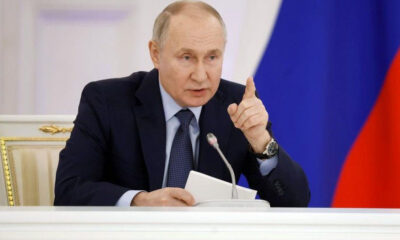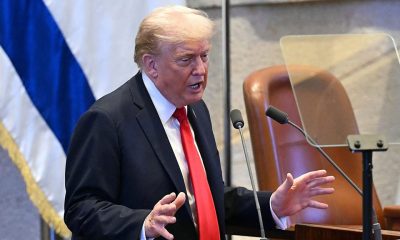International
China hosts Iran, Russia for nuclear talks

China hosts Iran, Russia for nuclear talks
Almost a decade since world powers sealed a historic deal to limit the Iranian nuclear programme, this is a crunch moment for Iran and the international community.
The country is now closer than ever to being able to make a nuclear bomb.
And the agreement – designed to prevent Iran developing a nuclear weapon – expires later this year.
“It’s a real fork in the road moment,” says Dr Sanam Vakil of the London-based think tank Chatham House. “Without meaningful and successful diplomacy we could see Iran weaponise or we could see a military strike against the Islamic Republic.”
The deal, painstakingly negotiated over nearly two years under Barack Obama’s presidency, imposed restrictions on Iran’s nuclear activities in return for relief from sanctions that crippled the country’s economy.
But after Donald Trump pulled out of the agreement in 2018 during his first presidency and reinstated US sanctions, Iran gradually stopped complying with its commitments.
It has accelerated its enrichment of uranium – used to make reactor fuel but also potentially nuclear bombs – to close to weapons-grade.
Experts say it would now take Iran less than a week to enrich enough material to make a single nuclear weapon.
Hence a flurry of urgent diplomatic activity by the US and the five other parties to the deal – the UK, China, France, Germany and Russia.
A closed-door meeting of the UN Security Council discussed Iran’s nuclear programme on Wednesday.
And China is hosting talks with Iran and Russia on Friday in search of a “diplomatic” resolution.
READ ALSO:
- Tinubu backs Obasa to remain Lagos speaker, ends assembly crisis
- Court bans viewing of controversial film, ‘Gang of Lagos’
- Real Madrid beat Atletico after bizarre penalty disallowed
“In the current situation, we believe that all parties should maintain calm and restraint to avoid escalating the Iran nuclear situation, or even walking towards confrontation and conflict,” Chinese foreign ministry spokeswoman Mao Ning said this week.
On Wednesday, a letter from President Trump was delivered in Tehran by a senior diplomat from the United Arab Emirates.
The contents have not been made public.
But President Trump, after imposing new sanctions on Iran as part of a “maximum pressure” campaign, last week issued a televised ultimatum to Iran: make a deal or else.
“I’ve written them a letter saying, ‘I hope you’re going to negotiate because if we have to go in militarily, it’s going to be a terrible thing,'” he said.
Iran’s Supreme Leader, Ayatollah Ali Khamenei, appeared to reject the idea of talks with a “bullying” US.
So too – publicly – has President Masoud Pezeshkian, who had previously supported a resurrection of the nuclear deal, in return for an end to sanctions.
But the country has been sending out mixed messages.
“There are camps inside the country that favour negotiations,” says Dr Vakil. “And there are camps that see weaponisation as the best opportunity for Iran to manage its security.”
Trust in the Trump administration is in very short supply.
“They have seen his erratic, very bullying approach to [Ukraine’s President Volodymyr] Zelensky. And his outlandish proposals on Gaza and they don’t want to be put in that position,” Dr Vakil adds.
Iran hates the humiliation of having a gun held to its head. But it is currently vulnerable – weakened militarily by Israeli air strikes last year, which are believed to have destroyed most of the air defences protecting its nuclear programme.
READ ALSO:
- El-Rufai given 48-hour ultimatum on NNPP crisis comment
- Nigerian woman declared dead appears in UK court to reclaim her £350,000 home
- Ex-Twitter CEO Jack Dorsey locked out of X account
Israel has long wanted to take the facilities out.
Iranian authorities continue to insist the country’s nuclear programme is for peaceful purposes.
But concern in the international community is becoming increasingly acute.
The International Atomic Energy Agency (IAEA) – tasked with monitoring the moribund nuclear deal – says it has seen Iran strengthen its nuclear capabilities at different facilities across the country over the past few years.
Its stock of uranium enriched up to 60% purity – close to the 90% required for a weapon – is “growing very, very fast”, according to IAEA Director General Rafael Grossi.
“The significantly increased production and accumulation of high enriched uranium by Iran, the only non-nuclear weapon state to produce such nuclear material, is of serious concern,” the IAEA says in its latest report.
But the nuclear watchdog is no longer in a position to verify exactly what Iran is doing, because the authorities have removed IAEA surveillance equipment.
Mr Grossi says diplomatic engagement with Iran – through whatever channels possible – is now urgent and “indispensable”.
On 18 October, the parties to the 2015 nuclear deal will lose the ability to impose so-called “snap-back” UN sanctions on Iran for violating its terms.
So the UK, France and Germany are wielding the threat of snap-back sanctions now, in the hope of exerting pressure while they still can.
“We are clear that we will take any diplomatic measures to prevent Iran acquiring a nuclear weapon, that includes the use of snapback, if needed,” the UK’s deputy UN ambassador, James Kariuki, said on Wednesday.
The stakes are high for Iran – and the world.
“If Tehran decides to build a bomb, it could enrich enough uranium for multiple warheads within weeks,” according to Dr Alexander Bollfrass, who focuses on preventing nuclear proliferation for the International Institute for Strategic Studies, another London-based think tank.
Designing and assembling a deliverable weapon would, however, take several months to a year or more, he told the BBC.
“Iran is closer than ever to nuclear weapons capability,” he says. “But it is still not clear if it has decided to develop nuclear weapons or if it is looking for negotiation leverage.”
China hosts Iran, Russia for nuclear talks
BBC
International
Indonesia Flood Disaster: Death Toll Exceeds 900 as Search for Hundreds Continues

Indonesia Flood Disaster: Death Toll Exceeds 900 as Search for Hundreds Continues
The death toll from the catastrophic Indonesia floods has risen to more than 900, with hundreds still missing as rescuers struggle to reach communities cut off by last week’s rare and powerful cyclone over the Malaca Strait. The storm unleashed torrential rain and severe landslides, destroying over 100,000 homes across multiple regions.
Authorities say relief efforts remain extremely challenging, with aid being air-dropped into isolated areas where roads and bridges have been washed away. The deadly floods form part of a chain of recent extreme weather disasters across Asia, bringing the combined regional death toll — including in Sri Lanka, Thailand, Malaysia, and Vietnam — close to 2,000.
READ ALSO:
- 25 Dead in Goa Nightclub Fire After Suspected Gas Explosion in Arpora
- Doctor Charged With Sexually Assaulting 38 Patients in West Midlands Hospitals
- Shettima Inaugurates Multi-Million Naira Juma’at Mosque in Gumel
In Aceh Tamiang, among the worst-hit districts, survivors described entire villages being swept away by surging waters. Residents of Lintang Bawah Village told the BBC Indonesian service that many families survived only by taking refuge on rooftops.
Fitriana, a survivor, recounted how some villagers endured three days without food or water as they clung to their homes: “Ninety percent of the houses in our village were destroyed,” she said, leaving 300 families displaced.
Another survivor described fleeing twice — first from his own home as floodwaters reached the second floor, and then again from a nearby village inundated overnight:
“While we were sleeping, water soaked the mattresses. There was no higher ground. We survived by climbing to the second floor of my daughter-in-law’s house.”
Indonesian authorities continue emergency operations as hopes fade for those still unaccounted for. The government has pledged expanded humanitarian support as the scale of the disaster becomes clearer.
Indonesia Flood Disaster: Death Toll Exceeds 900 as Search for Hundreds Continues
BBC
International
Russia Intensifies Airstrikes on Ukraine as Zelensky, Trump Envoys Advance Peace Talks
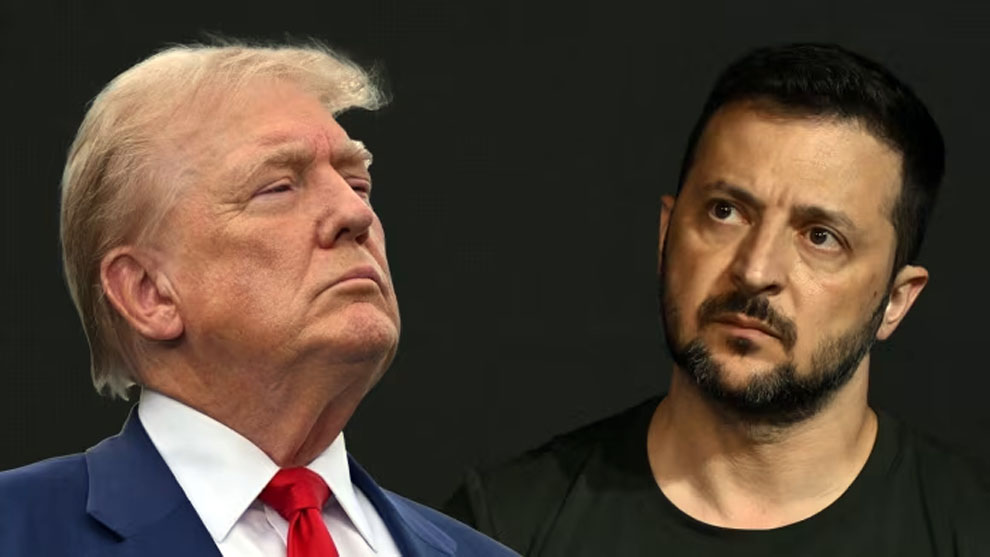
Russia Intensifies Airstrikes on Ukraine as Zelensky, Trump Envoys Advance Peace Talks
Russia has intensified its overnight aerial attacks on Ukraine, striking multiple regions just hours after President Volodymyr Zelensky described his discussions with Donald Trump’s negotiating team as “very constructive.” The renewed assaults come amid a fresh push for a US-led peace framework aimed at ending the nearly three-year-old war.
The mayor of Kremenchuk, a key industrial city in central Ukraine, confirmed the area suffered a “massive combined strike”, damaging critical infrastructure and leaving residents without water, electricity, and heat. No fatalities have been reported so far.
Russia’s defence ministry claimed it intercepted 77 Ukrainian drones across several locations during the same period, underscoring the ongoing intensity of the conflict despite diplomatic efforts.
Zelensky said he is “determined” to continue working closely with the US after three days of detailed negotiations in Miami involving Trump’s envoy Steve Witkoff and the former US president’s son-in-law Jared Kushner. Talks focused heavily on ensuring Russia’s compliance with any future peace agreement.
READ ALSO:
- 25 Dead in Goa Nightclub Fire After Suspected Gas Explosion in Arpora
- Doctor Charged With Sexually Assaulting 38 Patients in West Midlands Hospitals
- Shettima Inaugurates Multi-Million Naira Juma’at Mosque in Gumel
The US has been mediating a multi-point peace plan, though progress remains limited as Kyiv, Moscow, and European allies differ on key proposals. European leaders have pushed for additional security guarantees for Ukraine, including the possibility of a multinational peacekeeping force, an idea Russia has rejected.
French President Emmanuel Macron, UK Prime Minister Sir Keir Starmer, German Chancellor Friedrich Merz, and Zelensky are set to meet in London on Monday to coordinate Europe’s position on the evolving peace framework. Macron reiterated France’s commitment to achieving de-escalation and a ceasefire.
Meanwhile, the US and Ukraine have jointly urged Moscow to demonstrate “a serious commitment to long-term peace.” The appeal came after Witkoff returned from Kremlin talks with Vladimir Putin, which ended without a breakthrough.
Ukraine’s new chief negotiator Rustem Umerov said he and Witkoff have “agreed on the framework of security arrangements” and discussed deterrence measures needed to secure a durable peace.
The latest wave of Russian airstrikes — following a wider barrage a day earlier condemned by European leaders — underscores the gulf between diplomatic negotiations and realities on the ground as the war grinds on.
Russia Intensifies Airstrikes on Ukraine as Zelensky, Trump Envoys Advance Peace Talks
BBC
International
25 Dead in Goa Nightclub Fire After Suspected Gas Explosion in Arpora
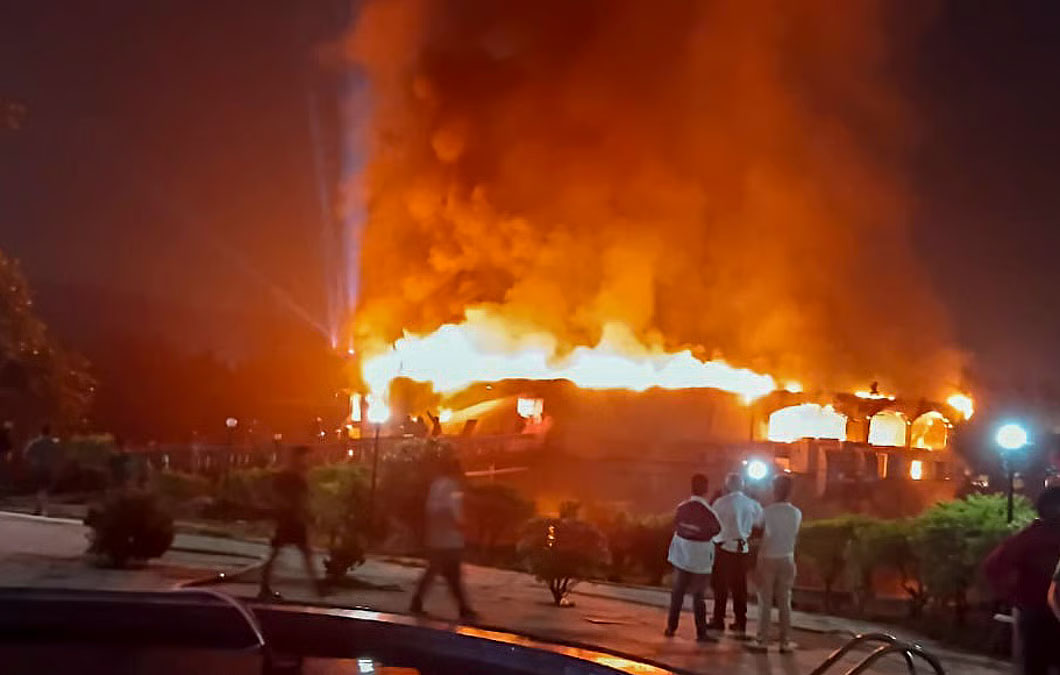
25 Dead in Goa Nightclub Fire After Suspected Gas Explosion in Arpora
A devastating inferno at a popular nightclub in Goa has left 25 people dead, with authorities confirming that most of the victims were employees of the establishment located in Arpora, North Goa. Several tourists are also among the casualties.
Officials say the blaze, which erupted around midnight on Saturday, was triggered by a suspected gas cylinder explosion in the club’s kitchen. The fire quickly tore through the premises, leading to scenes of panic in the bustling nightlife district.
Goa Director General of Police Alok Kumar confirmed that the fire was concentrated on the ground-floor kitchen area and has since been brought under control. Most bodies were recovered near the kitchen, reinforcing concerns that staff members bore the brunt of the tragedy.
Goa Chief Minister Pramod Sawant stated that three victims died from burn injuries, while others succumbed to suffocation. He also revealed that “three to four” tourists had been confirmed dead, though their identities and nationalities remain unknown.
According to The Indian Express, the incident occurred at Birch by Romeo Lane, a well-known club near Baga Beach, one of Goa’s busiest tourist hubs. The area is lined with nightlife venues that typically draw large crowds on weekends.
READ ALSO:
- Doctor Charged With Sexually Assaulting 38 Patients in West Midlands Hospitals
- Shettima Inaugurates Multi-Million Naira Juma’at Mosque in Gumel
- Police Launch Special Enforcement Team to Enforce Tinubu’s Ban on VIP Escorts
Witnesses described chaotic moments as screams filled the air moments after the explosion. One bystander told the BBC: “It was a normal Saturday night. Suddenly there were screams, and then we realized a massive fire had broken out. The scenes were horrific.”
Fire crews worked through the night, combing through charred debris to determine the full extent of damage and finalize victim identification. The remains of burnt furniture and décor were visible at the site on Sunday morning, now sealed off by security officials.
Victims’ bodies have been transferred to Goa Medical College in Panaji, where identification is underway before notifying families.
Chief Minister Sawant has ordered a formal inquiry into the cause of the blaze, promising that “those found responsible will face the most stringent action.” He expressed “deep grief” and extended condolences to affected families.
Indian Prime Minister Narendra Modi described the incident as “deeply saddening”.
Goa, a former Portuguese colony famed for its beaches, nightlife, and resorts, attracts millions of visitors annually. Government figures show 5.5 million tourists visited the state in the first half of the year, including 270,000 international travelers.
The tragedy adds to a growing list of fatal fires in entertainment venues across India, including recent incidents in Hyderabad, Kolkata, and Gujarat, often linked to poor safety standards and overcrowding.
25 Dead in Goa Nightclub Fire After Suspected Gas Explosion in Arpora
BBC
-

 Sports2 days ago
Sports2 days ago2026 FIFA World Cup Draw: England Draw Croatia as Brazil Face Morocco in Tournament Opener
-

 News2 days ago
News2 days agoAkpabio sues Natasha for ₦200bn over sexual harassment allegations
-

 metro2 days ago
metro2 days agoTinubu Govt Eliminates More Terrorists Than Previous Administrations — Fani-Kayode
-

 metro1 day ago
metro1 day agoNigerian woman sparks outrage for refusing chemotherapy despite ₦30 million donations over religious Beliefs
-

 metro2 days ago
metro2 days agoFour Teenagers Killed in Banki Explosion as Borno Police Probe Deadly IED Blast
-
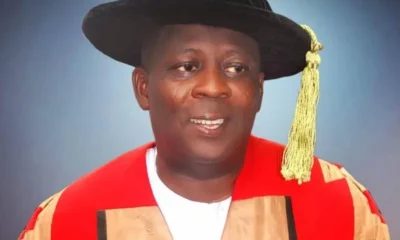
 Opinion3 days ago
Opinion3 days agoSiyan Oyeweso: Lessons in virtue and vanity
-

 Politics2 days ago
Politics2 days agoOsogbo Youth Group Condemns APC Over Disqualification of Adegoke SAN
-

 Entertainment2 days ago
Entertainment2 days agoDStv warns subscribers of possible loss of CNN, discovery, 10 other channels in 2026





